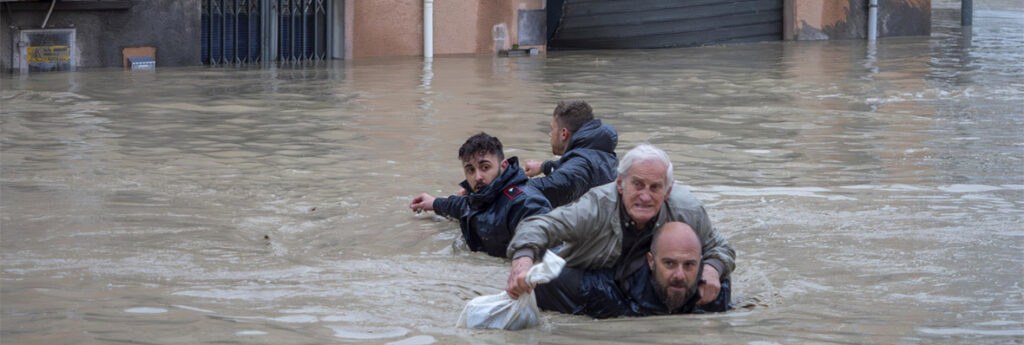Exceptional rains this week in a drought-struck region of northern Italy have swelled rivers over their banks, killing at least eight people, forcing the evacuation of thousands, and forcing Formula One to cancel this weekend’s Emilia-Romagna Grand Prix to not overtax emergency crews that are already stretched thin.
Days of rainstorms have stretched across a broad swath of northern Italy and the Balkans, where “apocalyptic” floods, landslides and evacuations are also being reported in Croatia, Bosnia and Slovenia. Rivers of mud have torn through the region, wreaking havoc on infrastructure and homes.
Rescue helicopters plucked people from rooftops as floodwaters rose ever higher in homes. In one rescue, a coast guard member pulled a woman out through a skylight from her home and held her tight as the two were winched to a hovering helicopter and pulled inside.
“Even upper floors aren’t safe any more,″ Gian Luca Zattini, mayor of Forli’, one of the hardest-hit towns, told Sky TG24 TV.
Italian Civil Protection Minister Nello Musumeci reported that an average of 200 mm of rain had fallen in 36 hours in the region, with some areas registering 500 mm in that period.
“If you consider that this region averages 1,000 mm of rain in a year, you realize the impact that these rains have had in these hours,” Musumeci said.
Citing the November landslide in Ischia, which killed a dozen people, he said that Italy is increasingly experiencing tropical weather seen in parts of Africa and other areas around the world, with long periods of drought punctuated by intense rainfall that can’t be absorbed by the soil.
“Nothing will ever be the same again… and what has happened in these hours is evidence of that,” Musumeci said. “When soil remains dry for a long time, instead of increasing its absorption capacity, it ends up cementing and allowing rainfall to continue flowing over the surface and causing absolutely unimaginable damage.”
Compounding Italy’s vulnerability to climate-change induced flooding are already fragile hydrological conditions in much of the country. Italy also must grapple with the decades-long practice of people building in areas prone to mudslides or floods – homes that are often allowed to stay in place thanks to occasional government amnesties.
Many residents evacuating homes put vital belongings in the rubber boats they’d normally tow each summer to the region’s flourishing beach resorts on the Adriatic Sea and pulled them through deluged streets.
Some regional train routes remained suspended Wednesday around Bologna and Ravenna, with severe delays elsewhere, the Italian state railway said.
In the Balkans, the swollen Una river flooded parts of northern Croatia and northwestern Bosnia, where authorities announced a state of emergency. The mayor of the town of Bosanska Krupa in Bosnia said that hundreds of homes had been flooded.
“We have an apocalypse,” Amin Halitovic told regional N1 network. “We can no longer count the flooded buildings. It’s never been like this.”
Dozens of landslides were reported in eastern Slovenia, many of which endangered homes and infrastructure.
In Croatia, hundreds of soldiers and rescue teams continued bringing food and other necessities to people in flood-hit areas who have been isolated in their homes. No casualties have been reported so far.

